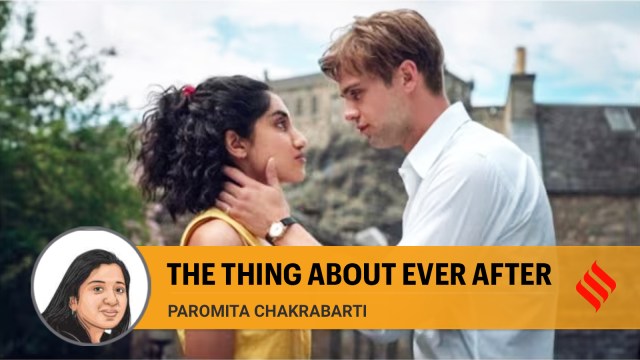
In so far as millennial wisdom goes, this seems to be a difficult time for modern love. The swipe-right-and-meet-your-match kind of love, but also the sort where one is thrown together with a stranger — perhaps at a party one was loathe to attend or on the first day of university — and discovers, to one’s consternation and (admit it) thrill, a frisson of irrational attraction. The conversation flows easily, a camaraderie is forged, and the future seems to sparkle with possibilities. But there is a wistful awareness that the spell might break when the day gets over — that there are far too many constraints, societal or personal, that may get in the way.
In Netflix’s One Day, the latest adaptation of David Nicholls’ 2009 novel that has struck such a chord with viewers, this is where Emma Morley, played delightfully by Ambika Mod, and Dexter Mayhew’s story begins — on the last day of university, after an evening of drunken revelry, falling in step perchance and discovering a spark that refuses to be snuffed out. She of double firsts and a working-class background; he, blessed with looks and means, making up in charm what he lacks in ambition. They know they are meant for different paths but in the meantime, there is between them that one unexpected night.
“Whatever happens tomorrow, we had today; and I’ll always remember it,” Emma tells Dexter (played by Leo Woodall), knowing little of the arc and span of their story.
It’s the kind of magic that everyone seems to be searching for, but it seems more difficult to come by than one would imagine. This month, a class-action lawsuit was filed against Match group, owner of dating apps such as Tinder, OkCupid and Hinge, for misleading their clientele and prioritising “profits over marketing promises and customer’s relationship goals” — in short, for consigning them to lives of singledom despite brief interludes of “connections”.
It might seem naive to expect faithfulness from tech companies, but what it points to is a crisis of intimacy. Given the advantages that algorithms promise to shore up in one’s favour, why is this still the age of loneliness? And when one does “match” with someone, is one equipped to deal with the emotional registers of a relationship IRL that comes with no how-to manual?
Romances on screen, including adaptations of novels in the genre, will have us believe that love exists in the grand gestures; in dramatic proclamations of devotion and sweeping narratives of sacrifice. One of the most jaded cliches of a movie, Love Actually (2003), philosophises, “If you look for it, I’ve got a sneaky feeling you’ll find that love actually is all around”; “I’m just a girl, standing in front of a boy, asking him to love her,” says Julia Roberts’ Anna Scott to William Thacker (Hugh Grant) in Notting Hill (1999).
But what comes after?
Over the course of the next 20 years of their lives, Emma and Dexter’s attraction collides and ricochets, morphing from almost-romance to friendship to situationship. Jobs and partners, cities and expectations change seasons; youth slides into middle age; love comes in, not sure-footed, but on tiptoes.
The 2011 cinematic adaptation might have been a copout, but what Nicole Taylor’s version of One Day conveys is that despite contrarian assertions, love can be both epic and quotidian, life-affirming and devastating. When the heady dopamine rush settles down, love can meander and dither, exasperate and anchor. It wrestles with anxieties, lights up with laughter. It recognises that people change or outgrow relationships. That the right people can meet at the wrong time and that not everyone gets to have closure.
The truth is, vulnerability is built into the language of intimacy. Some vacillations are hard to resolve with the swipe of a finger into neat boxes of yes and no. Love requires time and work, heartburn and hope. And there are no promises of happily ever afters. In Normal People, for instance, Marianne and Connell have to navigate their unequal relationship across the years to find safe ground; in this year’s Oscar-nominated Past Lives, regret forms the leitmotif of the story of two childhood sweethearts separated by geography and different dreams.
When their lives finally embrace, Emma steals a peek at their wedding speech Dexter is working on. In the clutter of hasty pointers, there’s one that stands out: “We grew up together”. “I liked that,” she tells him. Perhaps, that’s all there is to it — learning how to grow up with love.
paromita.chakrabarti@expressindia.com